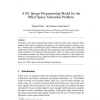Free Online Productivity Tools
i2Speak
i2Symbol
i2OCR
iTex2Img
iWeb2Print
iWeb2Shot
i2Type
iPdf2Split
iPdf2Merge
i2Bopomofo
i2Arabic
i2Style
i2Image
i2PDF
iLatex2Rtf
Sci2ools
116
click to vote
ENDM
2010
2010
A 0/1 Integer Programming Model for the Office Space Allocation Problem
We propose a 0/1 integer programming model to tackle the office space allocation (OSA) problem which refers to assigning room space to a set of entities (people, machines, roles, etc.), with the goal of optimising the space utilisation while satisfying a set of additional requirements. In the proposed approach, these requirements can be modelled as constraints (hard constraints) or as objectives (soft constraints). Then, we conduct some experiments on benchmark instances and observe that setting certain constraints as hard (actual constraints) or soft (objectives) has a significant impact on the computational difficulty on this combinatorial optimisation problem.
| Added | 10 Dec 2010 |
| Updated | 10 Dec 2010 |
| Type | Journal |
| Year | 2010 |
| Where | ENDM |
| Authors | Özgür Ülker, Dario Landa-Silva |
Comments (0)

